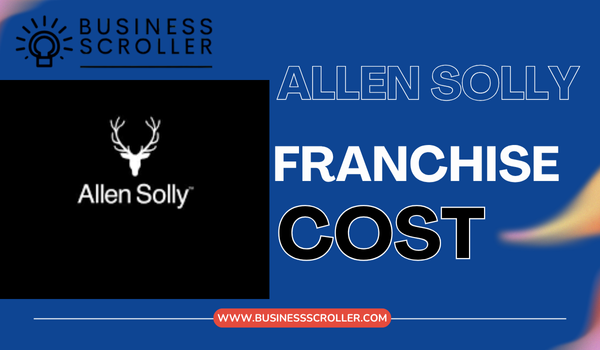Allen Solly is one of India’s well-known western-wear brands (part of the Aditya Birla group’s fashion portfolio). For entrepreneurs who want to enter branded apparel retail, an Allen Solly franchise or retail partnership is attractive because of strong brand recognition, organized supply chains and mall/high-street placement support from ABFRL. Below I break down the typical franchise models, practical cost ranges, ROI expectations, eligibility, and a step-by-step application process — plus a planning table you can use while budgeting. Wherever possible I’ve used official ABFRL guidance and multiple franchise directories to give realistic ranges; final costs depend heavily on city, mall vs street, store size and fit-out choices.
Why consider an Allen Solly franchise?

Allen Solly has strong visibility in men’s, women’s and kids’ apparel — a reliable footfall driver in malls and busy high streets. The brand benefits from ABFRL’s national procurement, merchandising and seasonal marketing support, which makes stocking, promotions and new-collection launches easier for franchise partners compared with an independent brand. If you can secure a good site and manage inventory/operations well, branded apparel can give predictable seasonal spikes and stable repeat business.
Common franchise / partnership models
- Exclusive Single-Brand Store (Franchise/Leased Outlet) — full Allen Solly store carrying the brand’s full assortment.
- Shop-in-Shop / Concession in a Department Store or Mall — smaller footprint inside a larger retail location.
- Franchisee + Distributor / Multi-Unit (Area Developer) — rights to open multiple stores in a region; higher investment, higher responsibilities.
- Outlet / Clearance Store — sometimes available in specific formats for clearance/closeout lines (depends on brand policy).
ABFRL may operate different models by city and location; many franchise portals report ABFRL prefers partners with retail experience and strong site (mall/high-street) credentials.
Indicative costs — planning table
The exact investment varies widely by format and city. Below is a consolidated planning table drawn from ABFRL’s estimated figures and multiple franchise directories — treat these as indicative ranges only.
| Cost item | Indicative range (INR) | Notes |
| Estimated one-time brand/franchise fee | ₹Nil – ₹5,00,000 (varies) | Some listings show no separate franchise fee while others list an upfront partnership fee depending on model. Confirm with ABFRL. |
| Store fit-out & interiors | ₹25,00,000 – ₹60,00,000 | Flooring, fixtures, customised joinery, lighting; malls cost more. |
| Initial inventory (first stock) | ₹10,00,000 – ₹35,00,000 | First collection + seasonal SKUs; branded assortments are capital-intensive. |
| Working capital / deposits (3–6 months) | ₹8,00,000 – ₹25,00,000 | Staff, rent, utilities, marketing buffer. |
| Monthly operating cost (rent + staff) | ₹1,50,000 – ₹6,00,000 | Depends on city & mall vs high-street. |
| Indicative total first-year outlay (single full-format store) | ₹40 Lakh – ₹1.2 Crore+ | Many directories cluster around ₹40–80L for standard stores; premium mall locations and larger formats push higher. |
Key official note: ABFRL’s partner/leasing page states “investment in store starts from approx. ₹50 Lakh for a 1,000 sq.ft. store” — this is a brand-level estimate and actuals will vary by size and location. Always request a written commercial sheet from ABFRL for your exact location.
Store size & location guidance
Franchise directories typically cite 800–1,500 sq.ft. as the desirable range for a full Allen Solly store; mall placements and high-street flags require excellent visibility and frontage. Smaller shop-in-shop formats can operate in 300–800 sq.ft. but will carry a limited assortment. If you’re aiming for tier-1 malls, budget higher fit-out and higher working capital.
Revenue, margins & ROI expectations
- Revenue drivers: average ticket size (brand premium vs value lines), footfall (mall > high-street in many cities), seasonality (festive quarters) and successful promotions.
- Margins: branded apparel gross margins are typically moderate after brand-managed pricing; franchise directories often indicate franchisee retention (after remittances and supplies) in the 65–76% range, though models vary. Validate margins in the commercial sheet.
- Payback: directories cite 12–36 months depending on location and scale (metro malls often take longer to breakeven due to higher rent, but can deliver higher absolute turnover). Use conservative footfall estimates when modelling.
Typical eligibility criteria
While ABFRL will confirm specifics per opportunity, common franchise requirements include:
- Proof of investment capacity and ability to provide working capital.
- Suitable retail premises (lease in place or confirmed landlord willingness) meeting the brand’s size and visibility criteria.
- Experience in retail or a management partner with retail expertise (preferred).
- Standard KYC and business documentation (PAN, GST, bank details).
- Ability to commit to the brand’s merchandising, staffing and SOPs.
Step-by-step: How to apply (practical)
- Shortlist format & location — pick full-store or shop-in-shop; secure possible sites or lease details.
- Contact ABFRL / Allen Solly partnership team — ABFRL has a franchise/partner enquiry contact form (use their partner/franchise email or contact page). Request the latest commercial sheet / lease & partner criteria.
- Submit documents & site details — photos, lease offer, bank references and brief business plan.
- Site inspection & commercial offer — ABFRL will visit the site, propose layout and share commercial terms (fittings, inventory supply, any advance).
- Agreement & payments — sign the franchise/lease agreement after legal review; get detailed timelines for store fit-out and inventory supply.
- Training & merchandising — brands usually support staff training, merchandising planogram and the first-season merchandise allocation.
- Launch & monitor KPIs — track sales per sq.ft, stock turns and margin by SKU; adjust assortments per local demand.
Practical tips & red flags
- Ask ABFRL for projected unit economics (sales per sq.ft. for comparable stores) and for references of nearby franchisees.
- Confirm whether ABFRL controls inventory pricing, mandatory PO / supply terms, and whether any marketing/royalty fees apply.
- Require a written breakdown of fit-out guidelines (who pays for joinery, who approves final fixtures) to avoid surprises.
- Red flags: large “verbal” requests for undisclosed deposits, unclear buy-back terms for unsold season stocks, or absence of a clear service/return policy.
Final word
An Allen Solly franchise is a strong option for an entrepreneur with retail experience (or a retail partner), access to prime real estate and the working capital to absorb seasonality. Typical single-store investments commonly range from ₹40 lakh to ₹1.2 crore+ depending on format and location — ABFRL’s guideline starts around ₹50 lakh for a ~1,000 sq.ft. store, but get the exact commercial sheet for your proposed site before committing.

Shashi Kant is the Founder and Editor of BusinessScroller.com, a leading platform for business insights, finance trends, and industry analysis. With a passion for journalism and expertise in business reporting, he curates well-researched content on market strategies, startups, and corporate success stories. His vision is to provide valuable information that empowers entrepreneurs and professionals. Under his leadership, BusinessScroller.com has grown into a trusted source for in-depth articles, customer care guides, and financial expertise.


